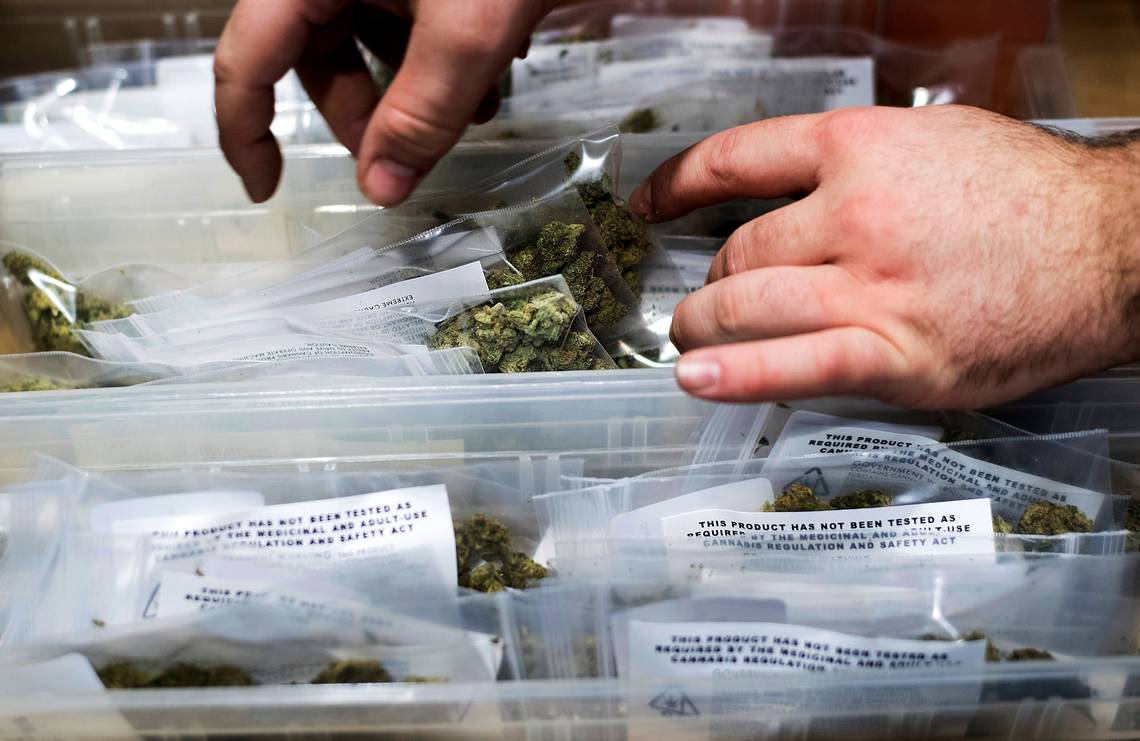As Fresno’s cannabis industry evolves, will people of color be locked out?
Fresno has not seen the last of the cannabis debates – and whether the city’s nascent pot industry will be inclusive of people of color remains a top unresolved issue.
Voters overwhelmingly approved a business license tax in November, and the Fresno City Council in December passed regulations for businesses. But another issue still isn’t settled: social equity in cannabis.
In the new industry, the words “social equity” generally refer to efforts to address the negative effects of marijuana-related criminalization on communities of color – and those with pot convictions – prior to Proposition 64, specifically during the war on drugs.
Passed by California voters in 2016, Prop. 64 legalized adult use of recreational marijuana in the state.
WAR ON DRUGS
According to a 2013 report by the American Civil Liberties Union, African American and white populations use marijuana at roughly the same rate, but blacks are more than three times as likely to be arrested for marijuana possession. The report used data from the FBI’s Uniform Crime Reporting program.
“Such racial disparities in marijuana possession arrests exist in all regions of the country, in counties large and small, urban and rural, wealthy and poor, and with large and small Black populations,” the report says.
The report concludes that the War on Drugs, particularly the War on Marijuana, was a failure, and the price paid for a marijuana conviction can linger for years, if not a lifetime.
Some California cities that entered the cannabis market have tried different social equity programs with mixed results.
FRESNO’S MARIJUANA JOURNEY
Since the early stages of Fresno’s cannabis policy discussions, cannabis industry members advocated for a social equity program.
Cesar Casamayor and Gidai Maaza, with The People’s Dispensary Fresno, penned a letter to city officials in March 2018 raising the issue.
They, along with other advocate groups, asked the city to analyze which groups and parts of the city were most affected by
marijuana-related arrests and convictions. They suggested hosting a workshop to discuss the health impacts of marijuana arrests and convictions, along with best practices to ensure the new cannabis industry would benefit communities most affected by criminalization.
“This cannabis movement is going to be one of two industries where if we as people of color are not in, we will be locked out of,” Maaza said in an interview with The Bee.
In a community meeting in May 2018 to discuss draft cannabis regulations, social equity was the No. 1 concern for industry members. They wanted to make sure current cannabis business owners, particularly minority owners, would not be penalized or turned away from the new industry. They also worried the costs to start a new business would be too great for anyone who isn’t a millionaire.
Former Councilman Oliver Baines, who recently termed out of office and previously worked on the city’s cannabis regulations, said Fresno has arrived at the appropriate time in the process to develop a social equity program. He believes community members should shape the equity program, he said.
“As policymakers, we shouldn’t dictate what it should be,” he said. “It should actually be a community discussion, and the community should weigh in and dictate that.”
Voters overwhelmingly approved a business license tax in November, and the Fresno City Council in December passed regulations for businesses. But another issue still isn’t settled: social equity in cannabis.
In the new industry, the words “social equity” generally refer to efforts to address the negative effects of marijuana-related criminalization on communities of color – and those with pot convictions – prior to Proposition 64, specifically during the war on drugs.
Passed by California voters in 2016, Prop. 64 legalized adult use of recreational marijuana in the state.
WAR ON DRUGS
According to a 2013 report by the American Civil Liberties Union, African American and white populations use marijuana at roughly the same rate, but blacks are more than three times as likely to be arrested for marijuana possession. The report used data from the FBI’s Uniform Crime Reporting program.
“Such racial disparities in marijuana possession arrests exist in all regions of the country, in counties large and small, urban and rural, wealthy and poor, and with large and small Black populations,” the report says.
The report concludes that the War on Drugs, particularly the War on Marijuana, was a failure, and the price paid for a marijuana conviction can linger for years, if not a lifetime.
Some California cities that entered the cannabis market have tried different social equity programs with mixed results.
FRESNO’S MARIJUANA JOURNEY
Since the early stages of Fresno’s cannabis policy discussions, cannabis industry members advocated for a social equity program.
Cesar Casamayor and Gidai Maaza, with The People’s Dispensary Fresno, penned a letter to city officials in March 2018 raising the issue.
They, along with other advocate groups, asked the city to analyze which groups and parts of the city were most affected by
marijuana-related arrests and convictions. They suggested hosting a workshop to discuss the health impacts of marijuana arrests and convictions, along with best practices to ensure the new cannabis industry would benefit communities most affected by criminalization.
“This cannabis movement is going to be one of two industries where if we as people of color are not in, we will be locked out of,” Maaza said in an interview with The Bee.
In a community meeting in May 2018 to discuss draft cannabis regulations, social equity was the No. 1 concern for industry members. They wanted to make sure current cannabis business owners, particularly minority owners, would not be penalized or turned away from the new industry. They also worried the costs to start a new business would be too great for anyone who isn’t a millionaire.
Former Councilman Oliver Baines, who recently termed out of office and previously worked on the city’s cannabis regulations, said Fresno has arrived at the appropriate time in the process to develop a social equity program. He believes community members should shape the equity program, he said.
“As policymakers, we shouldn’t dictate what it should be,” he said. “It should actually be a community discussion, and the community should weigh in and dictate that.”
After Fresno voters approved Measure A, a cannabis business license tax, and the city council passed regulations, leaders will look at social equity for groups negatively affected by the war on drugs.
By Alyssa Hodenfield
DISAGREEMENT ON CURRENT REGULATIONS
But city leaders remain unsure what the best path forward is. There’s even disagreement about the current regulations and how equitable they are.
In a December editorial published in The Bee, District 3 Councilman Miguel Arias argued that neighborhoods in his district, already hit hard by the war on drugs, will be harmed further by the city’s new cannabis regulations.
“The city’s ordinance carefully excludes industry participation of residents from neglected and low-income neighborhoods, which have been deeply impacted by the drug war, while forcing these same neighborhoods to bear all of the industry’s environmental impacts,” Arias wrote.
“Excluding entire communities from future prosperity is not only unfair, but it also ensures that the black market will continue to thrive and interfere with public safety for all of us.”
Days later, former Councilman Clint Olivier, who championed the cannabis issue for the city of Fresno, argued online at California Marijuana Policy that Fresno’s new rules may actually hit a sweet spot, in part because the regulations require each business to include a social equity piece in their business license application.
“It is hoped that by requiring each applicant to furnish its own equity plan, a variety of strategies as diverse as the city’s neighborhoods will be submitted,” Olivier wrote.
OTHER CALIFORNIA CITIES
In August 2018, Sacramento passed its Cannabis Opportunity Reinvestment and Equity (CORE) program, which aims to issue half of its business licenses to people impacted by the war on drugs and waives business license fees for qualified applicants, among other things.
Oakland’s program, however, faced criticism and essentially crumbled when limits on general applicants expired while hundreds of equity applicants still awaited approval on their licenses.
Malaki Seku-Amen, the president and CEO of California Urban Partnership, said Fresno has the opportunity to get social equity right the first time, and the best place to start is a social equity analysis.
So far, the city hasn’t done one and there doesn’t appear to be a plan for one.
Seku-Amen, who worked with city officials in Sacramento on the issue, described an analysis similar to what Maaza and Casamayor asked the city for – analyzing which racial groups and ZP codes were most affected by the war on drugs. He said it should be done by an independent academic group and include feedback from affected populations.
“The city, from a legal and moral standpoint, cannot treat marijuana regulations as something that is going to benefit only those who are wealthy,” he said. “The city has a responsibility to ensure that equity is woven throughout its entire cannabis policy framework.”
By Alyssa Hodenfield
DISAGREEMENT ON CURRENT REGULATIONS
But city leaders remain unsure what the best path forward is. There’s even disagreement about the current regulations and how equitable they are.
In a December editorial published in The Bee, District 3 Councilman Miguel Arias argued that neighborhoods in his district, already hit hard by the war on drugs, will be harmed further by the city’s new cannabis regulations.
“The city’s ordinance carefully excludes industry participation of residents from neglected and low-income neighborhoods, which have been deeply impacted by the drug war, while forcing these same neighborhoods to bear all of the industry’s environmental impacts,” Arias wrote.
“Excluding entire communities from future prosperity is not only unfair, but it also ensures that the black market will continue to thrive and interfere with public safety for all of us.”
Days later, former Councilman Clint Olivier, who championed the cannabis issue for the city of Fresno, argued online at California Marijuana Policy that Fresno’s new rules may actually hit a sweet spot, in part because the regulations require each business to include a social equity piece in their business license application.
“It is hoped that by requiring each applicant to furnish its own equity plan, a variety of strategies as diverse as the city’s neighborhoods will be submitted,” Olivier wrote.
OTHER CALIFORNIA CITIES
In August 2018, Sacramento passed its Cannabis Opportunity Reinvestment and Equity (CORE) program, which aims to issue half of its business licenses to people impacted by the war on drugs and waives business license fees for qualified applicants, among other things.
Oakland’s program, however, faced criticism and essentially crumbled when limits on general applicants expired while hundreds of equity applicants still awaited approval on their licenses.
Malaki Seku-Amen, the president and CEO of California Urban Partnership, said Fresno has the opportunity to get social equity right the first time, and the best place to start is a social equity analysis.
So far, the city hasn’t done one and there doesn’t appear to be a plan for one.
Seku-Amen, who worked with city officials in Sacramento on the issue, described an analysis similar to what Maaza and Casamayor asked the city for – analyzing which racial groups and ZP codes were most affected by the war on drugs. He said it should be done by an independent academic group and include feedback from affected populations.
“The city, from a legal and moral standpoint, cannot treat marijuana regulations as something that is going to benefit only those who are wealthy,” he said. “The city has a responsibility to ensure that equity is woven throughout its entire cannabis policy framework.”
In this Jan. 6, 2018, file photo, an employee stocks cannabis at a store shortly before its first day of recreational marijuana sales in San Francisco. In Fresno, voters overwhelmingly approved a marijuana business license tax in November, and the Fresno City Council in December passed regulations for businesses. But another issue still isn’t settled: social equity in cannabis.
Noah Berger Associated Press file
MOVING FORWARD
Arias plans to bring legislation forward in the spring that will provide a city definition for social equity and a program framework. The way the regulations are currently drafted, business applicants each get to define equity in their own way, he said. He believes the city should set the standard.
“For me personally, there have to be elements that directly improve the quality of life for areas in which businesses will be housed,” he said.
Casamayor and Maaza have met with Mayor Lee Brand and his staff to discuss the issue.
“We want to make sure we don’t make the mistakes other cities have on social equity and we have the best practices,” Casamayor said. “We feel it’s important to understand we have to compromise on some things. At end of day, our city is kind of conservative.”
Esmeralda Soria, District 1 council member, said the discussion is far from over.
Seku-Amen said, “It can’t be the last priority. Otherwise, what you’ll have is … as the market continues to open its doors for the big green rush, you’ll have wealthy investors driving through the door in Ferraris while low-income communities of color are either on their feet or riding bicycles.”
HOW WE REPORTED THIS STORY
The reporting began in early December with an interview with cannabis equity advocates.
The reporter conducted multiple follow-up interviews by phone with the advocates. Much of the reporting relied on background knowledge accumulated over time as the reporter followed on the city’s path to developing cannabis business regulations and a business license sales tax.
The reporter also researched news reports about other cities’ actions on the issue of cannabis equity, along with other cities’ social equity program outlines and analysis.
The reporter used quotes from published editorials written by current and former elected officials for part of the story. She also conducted phone interviews with current and former elected officials and an outside industry expert. The reporter asked several follow-up questions to the industry expert via email.
The reporter offered opportunity to comment to Mayor Lee Brand’s administration but did not receive a response.
Noah Berger Associated Press file
MOVING FORWARD
Arias plans to bring legislation forward in the spring that will provide a city definition for social equity and a program framework. The way the regulations are currently drafted, business applicants each get to define equity in their own way, he said. He believes the city should set the standard.
“For me personally, there have to be elements that directly improve the quality of life for areas in which businesses will be housed,” he said.
Casamayor and Maaza have met with Mayor Lee Brand and his staff to discuss the issue.
“We want to make sure we don’t make the mistakes other cities have on social equity and we have the best practices,” Casamayor said. “We feel it’s important to understand we have to compromise on some things. At end of day, our city is kind of conservative.”
Esmeralda Soria, District 1 council member, said the discussion is far from over.
Seku-Amen said, “It can’t be the last priority. Otherwise, what you’ll have is … as the market continues to open its doors for the big green rush, you’ll have wealthy investors driving through the door in Ferraris while low-income communities of color are either on their feet or riding bicycles.”
HOW WE REPORTED THIS STORY
The reporting began in early December with an interview with cannabis equity advocates.
The reporter conducted multiple follow-up interviews by phone with the advocates. Much of the reporting relied on background knowledge accumulated over time as the reporter followed on the city’s path to developing cannabis business regulations and a business license sales tax.
The reporter also researched news reports about other cities’ actions on the issue of cannabis equity, along with other cities’ social equity program outlines and analysis.
The reporter used quotes from published editorials written by current and former elected officials for part of the story. She also conducted phone interviews with current and former elected officials and an outside industry expert. The reporter asked several follow-up questions to the industry expert via email.
The reporter offered opportunity to comment to Mayor Lee Brand’s administration but did not receive a response.


